The effects of weak global demand on the export-oriented manufacturing sector saw the number of furloughed workers on formal unpaid leave programs in Taiwan rise by 848 to 11,738 from Sept. 7 to Friday last week, the Ministry of Labor said yesterday.
According to the ministry, 712 of the 848 newly furloughed people who worked in the manufacturing sector, for a total of 9,879 workers on unpaid leave programs as of Friday.
The number of employers with furlough programs in place also increased from 601 to 642, with manufacturers accounting for 296 of the total, the ministry said.

Photo: CNA
Labor Conditions and Equal Employment Division Deputy Director Wang Chin-jung (王金蓉) said the metal and electric machinery industry reported an additional 629 workers on unpaid leave programs in the week.
Aa bicycle component maker implemented a furlough program for the first time, Wang said, putting 140 workers on unpaid leave, while a vacuum equipment manufacturer added 170 workers to a total of 180 on unpaid leave.
The two manufacturers cited declining orders as the reason for implementing furlough programs, she said.
Despite the increase in furloughed workers in the industry as a whole, a lamp producer stopped its unpaid leave plan ahead of schedule by putting about 150 workers back on production lines in the week as the company received short-term orders, Wang said.
However, it was too early to say whether the lamp maker’s improved operations would continue, she added.
In the information technology and electronics industry, the number of furloughed workers rose by 151 in the week, with an optoelectronics maker reporting that it had placed about 70 workers on unpaid leave, Wang said.
The labor ministry has provided the latest furlough data in the manufacturing sector to the Ministry of Economic Affairs to help the ministry better understand industry conditions, she said.
On the other hand, the service sector has remained resilient and experienced slight fluctuations in furlough worker numbers amid strong domestic demand in the post-COVID-19 pandemic era, Wang said.
The number of furloughed workers in the retail and wholesale industry rose to 941 as of Friday from 820 on Sept. 7, while the number in the lodging and food and beverage industry has stayed unchanged at 75, the ministry said.
The support service industry, which is comprised of travel agencies, also reported 497 furloughed workers, down from 501 a week earlier, the labor ministry added.

When an apartment comes up for rent in Germany’s big cities, hundreds of prospective tenants often queue down the street to view it, but the acute shortage of affordable housing is getting scant attention ahead of today’s snap general election. “Housing is one of the main problems for people, but nobody talks about it, nobody takes it seriously,” said Andreas Ibel, president of Build Europe, an association representing housing developers. Migration and the sluggish economy top the list of voters’ concerns, but analysts say housing policy fails to break through as returns on investment take time to register, making the

NOT TO WORRY: Some people are concerned funds might continue moving out of the country, but the central bank said financial account outflows are not unusual in Taiwan Taiwan’s outbound investments hit a new high last year due to investments made by contract chipmaker Taiwan Semiconductor Manufacturing Co (TSMC, 台積電) and other major manufacturers to boost global expansion, the central bank said on Thursday. The net increase in outbound investments last year reached a record US$21.05 billion, while the net increase in outbound investments by Taiwanese residents reached a record US$31.98 billion, central bank data showed. Chen Fei-wen (陳斐紋), deputy director of the central bank’s Department of Economic Research, said the increase was largely due to TSMC’s efforts to expand production in the US and Japan. Investments by Vanguard International

WARNING SHOT: The US president has threatened to impose 25 percent tariffs on all imported vehicles, and similar or higher duties on pharmaceuticals and semiconductors US President Donald Trump on Wednesday suggested that a trade deal with China was “possible” — a key target in the US leader’s tariffs policy. The US in 2020 had already agreed to “a great trade deal with China” and a new deal was “possible,” Trump said. Trump said he expected Chinese President Xi Jinping (習近平) to visit the US, without giving a timeline for his trip. Trump also said that he was talking to China about TikTok, as the US seeks to broker a sale of the popular app owned by Chinese firm ByteDance Ltd (字節跳動). Trump last week said that he had

STRUGGLING TO SURVIVE: The group is proposing a consortium of investors, with Tesla as the largest backer, and possibly a minority investment by Hon Hai Precision Nissan Motor Co shares jumped after the Financial Times reported that a high-level Japanese group has drawn up plans to seek investment from Elon Musk’s Tesla Inc to aid the struggling automaker. The group believes the electric vehicle (EV) maker is interested in acquiring Nissan’s plants in the US, the newspaper reported, citing people it did not identify. The proposal envisions a consortium of investors, with Tesla as the largest backer, but also includes the possibility of a minority investment by Hon Hai Precision Industry Co (鴻海精密) to prevent a full takeover by the Apple supplier, the report said. The group is